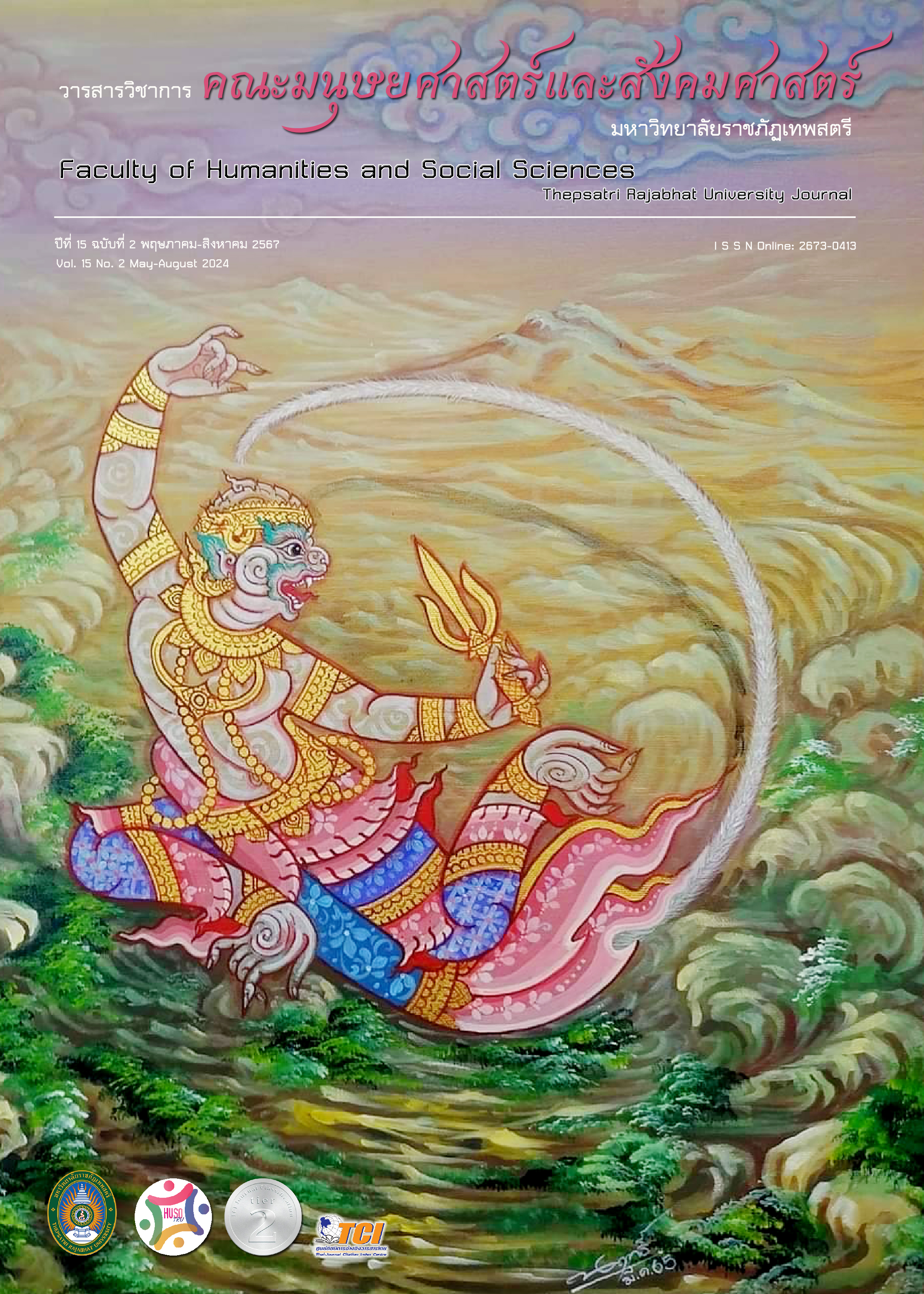Effects of Learning Management Via Experiential Learning Approach on Social Consciousness for Undergraduate Degree Students, Bachelor of Education (Social Studies)
Main Article Content
Abstract
This research aimed to: 1. compare the social consciousness of undergraduate social studies students before and after implementing a learning management approach based on experiential learning, and 2. evaluate the social consciousness of these students after applying the experiential learning approach. The sample consisted of 26 third-year undergraduate students majoring in Social Studies from the Faculty of Humanities and Social Sciences at Thepsatri Rajabhat University, selected through a cluster random sampling method. The research instruments included the course plan for the "Global Perspective" subject, the learning unit on "Coexistence in Society" utilizing the experiential learning approach, and a social consciousness assessment. Data were analyzed using mean, standard deviation, and dependent t-tests. The research findings were as follows: 1. The social consciousness of undergraduate social studies students significantly increased after participating in the experiential learning approach, with a statistical significance level of .05. 2. The mean score of social consciousness post-intervention indicated a high level of social consciousness among the students.
Downloads
Article Details

This work is licensed under a Creative Commons Attribution-NonCommercial-NoDerivatives 4.0 International License.
The content and information presented in articles published in the Academic Journal of the Faculty of Humanities and Social Sciences, Thepsatri Rajabhat University, are solely the opinions and responsibilities of the respective authors. The editorial board of the journal neither necessarily agrees with nor assumes any responsibility for such content in any manner whatsoever.
All articles, information, content, and images published in the Academic Journal of the Faculty of Humanities and Social Sciences, Thepsatri Rajabhat University, are the copyright of the journal. Any person or organization wishing to reproduce, disseminate, or otherwise utilize all or any part thereof must obtain prior permission from the Academic Journal of the Faculty of Humanities and Social Sciences, Thepsatri Rajabhat University.
References
คณะมนุษยศาสตร์และสังคมศาสตร์ มหาวิทยาลัยราชภัฏเทพสตรี. (2562). หลักสูตรครุศาสตรบัณฑิต สาขาวิชาสังคมศึกษา (4 ปี) (หลักสูตรปรับปรุง พ.ศ. 2562). ลพบุรี: มหาวิทยาลัยราชภัฏเทพสตรี.
บุญชม ศรีสะอาด. (2560). การวิจัยเบื้องต้น (พิมพ์ครั้งที่ 10). กรุงเทพฯ: สุวีริยาสาส์น.
วรัทยา พรหมสุนทร. (2562). ความคิดเห็นของเด็กและเยาวชนต่อความสำคัญของปัญหาสังคม: ศึกษาเฉพาะกรณีเด็กและเยาวชนในจังหวัดสงขลา. สารนิพนธ์ปริญญามหาบัณฑิต สถาบันบัณฑิตพัฒนบริหารศาสตร์.
สมศักดิ์ ภู่วิภาดาวรรธน์. (2554). การยึดผู้เรียนเป็นศูนย์กลางและการประเมินตามสภาพจริง. เชียงใหม่: โรงพิมพ์แสงศิลป์.
Ammentorp, L. (2007, April). Imagining Social Change: Developing Social Consciousness in An Arts-Based Pedagogy. Outlines. Critical Practice Studies, 9(1), 38 – 52.
Arnstein, R. S. (1969, November). A Ladder of Citizen Participation. Journal of the American Planning Association, 35(4), 216 – 224.
Daft, L. (2008). The Leadership Experience (4th ed). U.S.A: Thomson South – Western. London: Sage Publication.
Honey, P., & Mumford, A. (1992). The Manual of Learning Styles (2nd ed.). Maidenhead, UK: Peter Honey and Alan Mumford.
Kolb, D. A. (1984). Experiential Learning: Experience as the Source of Learning and Development. New Jersey: Prentice Hall.
Laurian, L. (2009, December). Trust in Planning: Theoretical and Practical Considerations for Participatory and Deliberative Planning. Planning Theory & Practice, 10(3), 369 - 391.
Pandey, A., & Gupta, K. (2008, July). A Perspective of Collective Consciousness of Business Organizations. Journal of Business Ethics, 80(4), 889 - 898.
Pitner, R.O., & Sakamoto, I. (2005, October). The Role of Critical Consciousness in Multicultural Practice: Examining How Its Strength Becomes Its Limitation. American Journal of Orthopsychiatry, 75(4), 684–694.
Rokeach, M. (1973). The Nature of Human Values and Value Systems. New York: Free Press.
Schlitz, M. M., Vieten, C., & Miller, E. M. (2010, January). Worldview Transformation and the Development of Social Consciousness. Journal of Consciousness Studies, 17(7 - 8), 18–36.
Schneider, C. (2010, Autumn). Developing Socially Responsible Behavior in Managers. Journal of Corporate Citizenship, 2010(39), 21 - 40.
Thibaut, J. W., & Kelley, H. H. (1956). The Social Psychology of Groups. New York: Wiley.
Tijunaitiene, R., & Balciunas, S. (2010, October). Individualistic Motivation of Citizens Participating in Civil Society Organization. Inzinerine Ekonomika-Engineering Economics, 21(4), 408 – 416.
Vieten, C., Amorok, T., & Schlitz, M. (2006, January). I To We: The Tole of Consciousness Transformation in Compassion and Altruism. Zygon: Journal of Religion and Science, 41(4), 917 – 931.
Vygotsky, L.S. (1987). The Collected Works of L.S. Vygotsky: Vol.1, Problems of General Psychology, Including the Volume Thinking and Speech. New York: Plenum.


